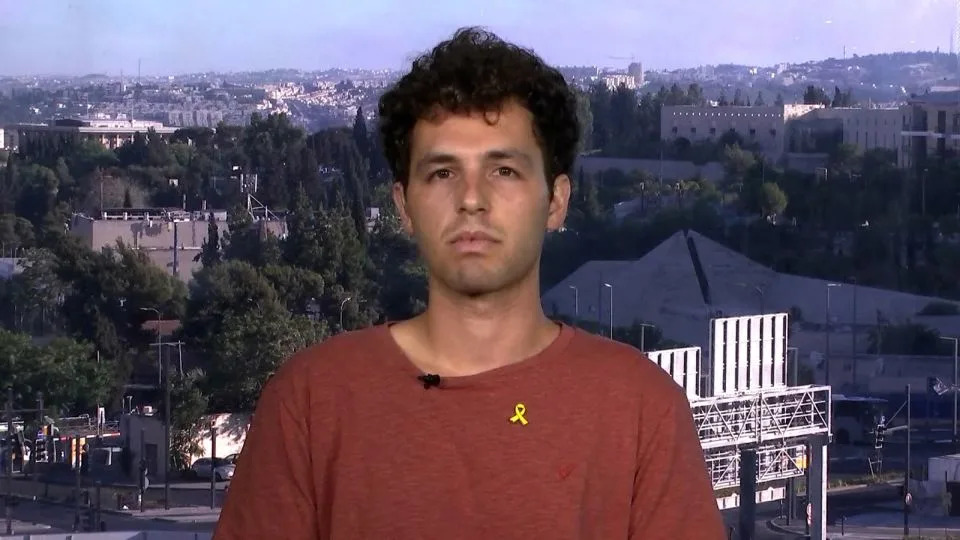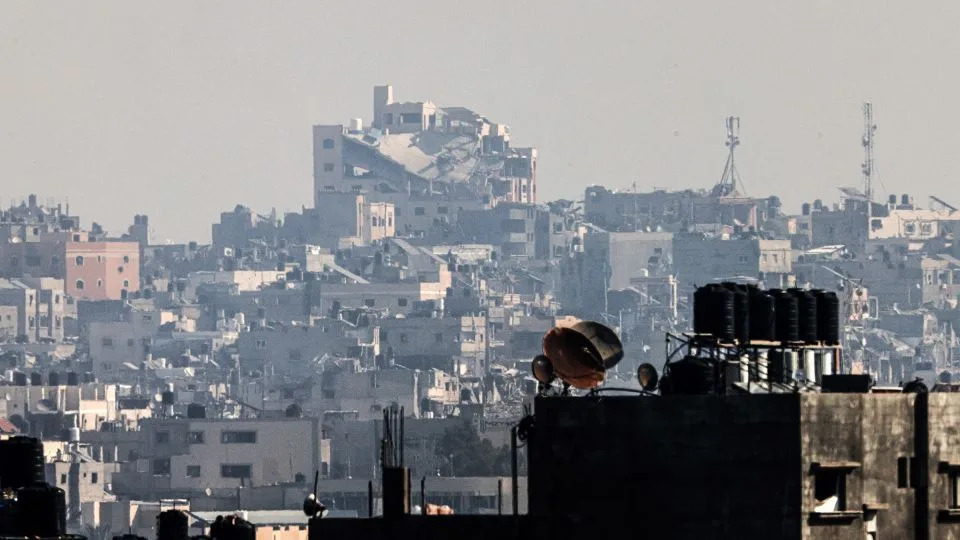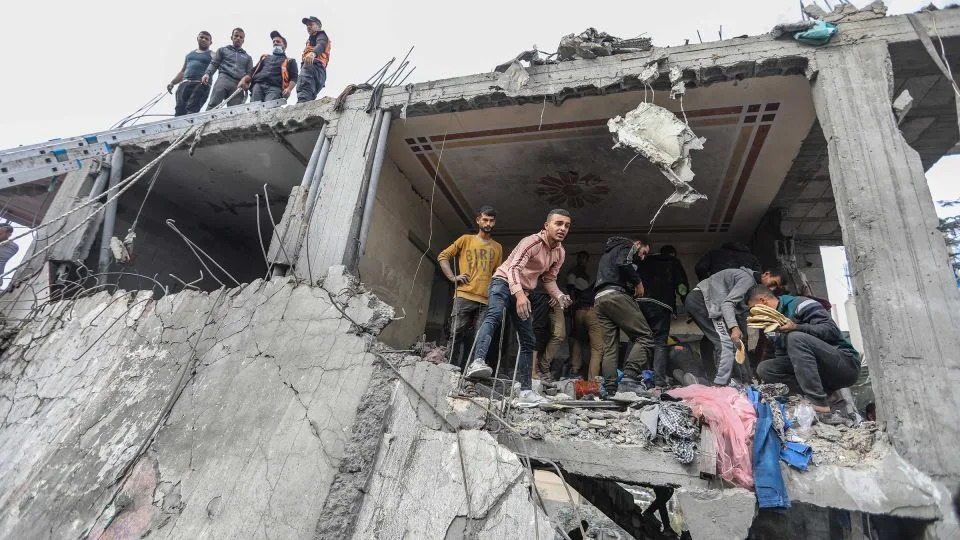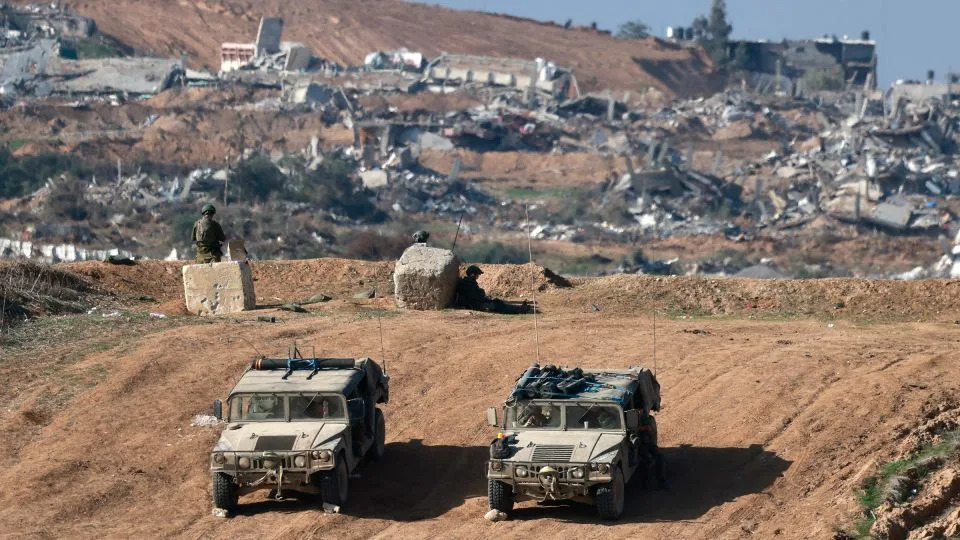THE MOST MORAL ARMY IN THE WORLD
Palestinian homes were destroyed ‘for revenge,’ says Israeli soldier who served in GazaAmi Kaufman and Bianna Golodryga, CNN
Thu, August 1, 2024
Destroyed homes, looting, and a desire for revenge. A former Israel Defense Forces (IDF) reservist has alleged serious misconduct by Israeli forces in Gaza, and a lack of discipline in the command structure, in an interview with CNN.
Yuval Green, a 26-year-old former paratrooper, is one of a handful of soldiers who have served in Israel’s war against Hamas and are now publicly criticizing the way it is being prosecuted.
Green described the behavior and alleged misdeeds of his reservist peers while serving in the Palestinian enclave, and the day he decided to tell his commanders he could no longer be part of his unit.
Israel launched its military offensive in Gaza on October 7 after Hamas attacked southern Israel. At least 1,200 people were killed, and more than 250 others abducted in the assault, according to Israeli authorities.
Israeli military action in the strip has killed nearly 40,000 Palestinians and injured over 90,000, according to Gaza’s Ministry of Health. As of early July, nearly 2 million people had been displaced in Gaza – almost the entire population, according to figures from the United Nations.
Green, who served as a medic in his unit, told CNN that prior to October 7 – when he was recruited for reserve duty – he had intended to leave the army, objecting to its conduct in the Israeli-occupied West Bank. He had planned to tell his comrades on October 8, but after Hamas attacked, he felt duty-bound to support them as they were mobilized for the war.
“When the 7th of October struck, it was difficult for me at this time to tell them that I’m not willing to come with them,” Green said. “So I decided to join my friends … I didn’t know what would be the right thing to do.”

Yuval Green, a former Israeli paratrooper, speaks to CNN. - CNN
Atmosphere of ‘demonizing Gazans’
Green told CNN that he served in the Gaza perimeter in November last year before being sent into the strip on December 2, spending 51 days in the city of Khan Younis, in the south. He said that the anger felt by Israelis after October 7 and calls for revenge were expressed openly in his unit, as they waited to be sent into Gaza, and called it the “demonizing” of Palestinians.
“In the days before we entered Khan Younis … there was this atmosphere that was kind of growing of demonizing the Gazans,” he said, adding that he heard people “speaking about killing, ruining all of Gaza. Wiping it out became something that people (were discussing), as if it was some kind of a legitimate idea.”
IDF rules of engagement in Gaza have been under great scrutiny. Green claims that IDF commanders on the ground seemed to acquiesce to soldiers’ desires to have fewer restrictions on their conduct than in previous incursions.
“I felt like my commanders were trying to kind of go with the soldiers and try to say things that they thought … (were) what the soldiers wanted to hear. You know, saying things like, ‘We’re not going to have any boundaries in Gaza this time.’”
Green said he did not serve during earlier cycles of violence in Gaza but took part in guard duty on the Gaza perimeter and in the West Bank, as well as training.

A view of destruction in Khan Younis, in southern Gaza, on December 17, 2023, after weeks of Israeli bombardment. - Mahmud Hams/AFP/Getty Images/File
‘We don’t care enough’ about Palestinian lives
The war in Gaza has caused widespread material destruction to homes, infrastructure, hospitals and schools. Green says he witnessed the “unnecessary” destruction of Palestinian homes.
“We’ve seen a lot of destruction that was not necessarily related to military reasons. Everything tends to (get) really mix up, you know – people are destroying houses because they believe that they should (get) revenge (for) what happened on (October 7) and it mixes up with the reasons to destroy houses for military reasons,” Green said, adding he witnessed “chaos … I could tell you 100% that we’ve destroyed houses at least for reasons that … we don’t care enough about the lives of Palestinians.”
Describing the extent of the damage in Gaza, he said, “You can’t imagine it. Cities that are completely ruined.”

Palestinians carry out search and rescue operations following an airstrike on December 7, 2023, in Khan Younis. - Ahmad Hasaballah/Getty Images/File
Accusations of looting
Green told CNN that one of the things that bothered him most was witnessing what he alleged was the looting of Palestinian homes by soldiers in his own unit.
“You’re seeing looting by your peers all the time. That was something (that) was very difficult for me to see. I mean, people were taking ‘souvenirs’ (from) the Palestinians’ houses, which I think directly relates to the demonization we’ve seen before the entrance to Khan Younis,” he said. “People were taking, you know, necklaces and doing graffiti on the walls and … leaving behind damage to the houses that was just completely unnecessary.”
When asked if he thinks this behavior was condoned by IDF commanders, Green said that officially, they disapproved of such conduct – but were unable to stop it.
“The superior commanders of the IDF, I think they do believe that this shouldn’t happen – looting or graffiti,” Green said. “But I don’t think (the IDF) has the resources to stop it, and I think, you know, it all comes down to the soldiers (in) the field. You can’t stop any soldier from doing things.”
While witnessing the alleged looting, Green said he confronted his peers, which resulted in “a lot of arguments,” but he was unable to sway his superiors to act: “Some of them agreed with me, some of them didn’t – or some of them, you know, were in between.”
“But all of them weren’t able to control our actions.”
The decision to leave
In the end, one specific moment pushed Green to make the tough decision to leave his unit: when a commander allegedly ordered the burning of a Palestinian home they were stationed in.
“At some point, my commander told my platoon to burn down the house we’re staying at,” Green recounted. “And I went to him, I approached him and I asked him, ‘Why are we doing that?’ And he gave me a few reasons, and I think those reasons were just not strong enough.”
“They were, you know, military type of reasons, but they (were mixed up with) the revenge type of reasons. Now, I think this is just what’s going on in Gaza. Israel is doing things because it needs to fulfil a type of military purpose, but it all mixes up with our need for – or the Israeli need for – revenge.”
“I said, ‘I’m not willing to participate in that. I’m not destroying a house that belonged to a few families that would become homeless because of that – and I’m leaving.’ And I just (left) with the next car that went out.”
Green said he decided to speak out publicly to put pressure on the Israeli government to accept a ceasefire and hostage deal. The Israeli government said this week that it was Hamas leadership that was preventing an agreement.
“I think there are concrete deals on the table right now, that Hamas is agreeing to, that make sense. I mean, those deals say that all the hostages would be freed – and Israel is not accepting the ending of the war. And this is crazy,” Green said.
Green added that Israel’s alleged refusal to accept a deal was causing the deaths of hostages. “I’ve seen it from within,” he said. “I mean, we said nothing before we entered Gaza about the hostages. We could have killed them, you know, any moment, and it’s something that has happened. We know about more than 10 hostages that were killed directly from Israeli bombings or, you know, the three hostages that were killed,” referring to an incident of friendly fire by the IDF in December, in which soldiers fatally shot three hostages.
The possibility that hostages have been killed during Israeli bombardments is a sensitive one in Israel. There have been occasions when officials have announced that hostages were believed to have been killed while in captivity, but at no point have any such announcements been attributed to Israeli airstrikes. The Israeli army has not responded to CNN’s request for comment on Green’s claims.
“We have to tell our government to stop the war. This is the only right solution to save the lives of Palestinians that are dying every day and going through a living hell the past few months, saving the lives of soldiers, Israeli soldiers, that are now present in Gaza and dying every day, and obviously the lives of hostages.”

Israeli military vehicles in southern Israel, near the border with Gaza, on December 25, 2023. - Menahem Kahana/AFP/Getty Images/File
Facing criticism at home
In June, Green cosigned a letter with 40 other reservists refusing to serve in the southern Gaza city of Rafah. He is one of only three soldiers who have come out publicly, and his family and friends have voiced concern over his decisions.
“Obviously it’s something very controversial in Israel, but I was willing to sacrifice, you know, my privacy and (to come) out with a topic as controversial as that, because I believe that right now, it’s a matter of life and death.
“When people are criticizing me for that, and I’ve heard people … that said they were worried that I might get hurt in that process – that always felt very weird because, you know, I went inside Gaza. I literally have risked my life. But people are now more afraid that I might get hurt, you know, by just coming out with words,” he added. “It’s part of the problem with our situation right now.”
Reflecting on the violence committed by Hamas, he also urged Palestinians not to support Hamas or call for an intifada: “They don’t understand that those calling for violence are damaging the Palestinian cause, and have been killing Palestinians for years now … I support Palestine too, but don’t confuse between supporting Palestine and supporting the violence of Hamas.”
CNN has reached out to the IDF for comment on Green’s allegations.
Responding to Green’s allegations, the IDF stated: “The actions of the IDF and its operational activity in particular are subject to Israeli law and international law, which is reflected, among other things, in the rules of engagement among other military orders … IDF commanders are guided by values of the IDF and lead the soldiers on the battlefield in a professional manner. When events that defer from the expected conduct occur, they are handled by the commanders as required.
“In some cases, IDF forces are required to act to remove a threat posed to them from buildings located in the territory of the Gaza Strip. The destruction of buildings is done with the appropriate means. Actions done otherwise, and not as a result of operational needs, are contrary to the army’s orders and the IDF’s values and are examined. Taking property that is not in accordance with the army’s orders is prohibited by law and is not in line with the values of the IDF. Incidents in which forces acted not in accordance with the orders and the law are examined and will continue to be examined, including as part of investigations by the MPCID (Military Police Criminal Investigation Division). As a general rule, when details concerning concrete events are given, they are reviewed and dealt with accordingly.”
For more CNN news and newsletters create an account at CNN.com
No comments:
Post a Comment